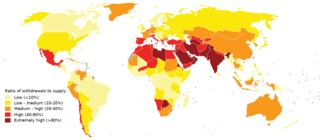
The Holocene extinction, or Anthropocene extinction, is the ongoing extinction event caused by humans during the Holocene epoch. These extinctions span numerous families of plants and animals, including mammals, birds, reptiles, amphibians, fish, and invertebrates, and affecting not just terrestrial species but also large sectors of marine life. With widespread degradation of biodiversity hotspots, such as coral reefs and rainforests, as well as other areas, the vast majority of these extinctions are thought to be undocumented, as the species are undiscovered at the time of their extinction, which goes unrecorded. The current rate of extinction of species is estimated at 100 to 1,000 times higher than natural background extinction rates and is increasing. During the past 100–200 years, biodiversity loss and species extinction have accelerated, to the point that most conservation biologists now believe that human activity has either produced a period of mass extinction, or is on the cusp of doing so. As such, after the "Big Five" mass extinctions, the Holocene extinction event has also been referred to as the sixth mass extinction or sixth extinction; given the recent recognition of the Capitanian mass extinction, the term seventh mass extinction has also been proposed for the Holocene extinction event.

Meat is animal flesh that is eaten as food. Humans have hunted, farmed, and scavenged other animals for meat since prehistoric times. The establishment of settlements in the Neolithic Revolution allowed the domestication of animals such as chickens, sheep, rabbits, pigs, and cattle. This eventually led to their use in meat production on an industrial scale in slaughterhouses.

Sustainable development is an organizing principle that aims to meet human development goals while also enabling natural systems to provide necessary natural resources and ecosystem services to humans. The desired result is a society where living conditions and resources meet human needs without undermining the planetary integrity and stability of the natural system. Sustainable development tries to find a balance between economic development, environmental protection, and social well-being. The Brundtland Report in 1987 defined sustainable development as "development that meets the needs of the present generation without compromising the ability of future generations to meet their own needs". The concept of sustainable development nowadays has a focus on economic development, social development and environmental protection for future generations.

Consumerism is a social and economic order in which the goals of many individuals include the acquisition of goods and services beyond those that are necessary for survival or for traditional displays of status. Consumerism has historically existed in many societies, with modern consumerism originating in Western Europe before the Industrial Revolution and becoming widespread around 1900. In 1899, a book on consumerism published by Thorstein Veblen, called The Theory of the Leisure Class, examined the widespread values and economic institutions emerging along with the widespread "leisure time" at the beginning of the 20th century. In it, Veblen "views the activities and spending habits of this leisure class in terms of conspicuous and vicarious consumption and waste. Both relate to the display of status and not to functionality or usefulness."
Overconsumption describes a situation where a consumer overuses their available goods and services to where they can't, or don't want to, replenish or reuse them. In microeconomics, this may be described as the point where the marginal cost of a consumer is greater than their marginal utility. The term overconsumption is quite controversial in use and does not necessarily have a single unifying definition. When used to refer to natural resources to the point where the environment is negatively affected, it is synonymous with the term overexploitation. However, when used in the broader economic sense, overconsumption can refer to all types of goods and services, including manmade ones, e.g. "the overconsumption of alcohol can lead to alcohol poisoning". Overconsumption is driven by several factors of the current global economy, including forces like consumerism, planned obsolescence, economic materialism, and other unsustainable business models and can be contrasted with sustainable consumption.

The Anthropocene is a proposed geological epoch dating from the commencement of significant human impact on Earth's geology, landscape, limnology and ecosystems, including, but not limited to, anthropogenic climate change. The nature of the effects of human activities on Earth can be seen for example in biodiversity loss, climate change, biogeography and nocturnality parameters, changes in geomorphology and stratigraphy.

Human impact on the environment refers to changes to biophysical environments and to ecosystems, biodiversity, and natural resources caused directly or indirectly by humans. Modifying the environment to fit the needs of society is causing severe effects including global warming, environmental degradation, mass extinction and biodiversity loss, ecological crisis, and ecological collapse. Some human activities that cause damage to the environment on a global scale include population growth, neoliberal economic policies and rapid economic growth, overconsumption, overexploitation, pollution, and deforestation. Some of the problems, including global warming and biodiversity loss, have been proposed as representing catastrophic risks to the survival of the human species.
Human overpopulation describes a concern that human populations may become too large to be sustained by their environment or resources in the long term. The topic is usually discussed in the context of world population, though it may concern individual nations, regions, and cities.

Joseph J. Romm is an American researcher, author, editor, physicist and climate expert, who advocates reducing greenhouse gas emissions to limit global warming and increasing energy security through energy efficiency and green energy technologies. Romm is a Fellow of the American Association for the Advancement of Science. In 2009, Rolling Stone magazine named Romm to its list of "100 People Who Are Changing America", and Time magazine named him one of its "Heroes of the Environment (2009)", calling him "The Web's most influential climate-change blogger".
The Stern Review on the Economics of Climate Change is a 700-page report released for the Government of the United Kingdom on 30 October 2006 by economist Nicholas Stern, chair of the Grantham Research Institute on Climate Change and the Environment at the London School of Economics (LSE) and also chair of the Centre for Climate Change Economics and Policy (CCCEP) at Leeds University and LSE. The report discusses the effect of global warming on the world economy. Although not the first economic report on climate change, it is significant as the largest and most widely known and discussed report of its kind.
Christian views on environmentalism vary among different Christians and Christian denominations.

Water scarcity is the lack of fresh water resources to meet the standard water demand. There are two types of water scarcity namely physical and economic water scarcity. Physical water scarcity is where there is not enough water to meet all demands, including that needed for ecosystems to function. Arid areas for example Central Asia, West Asia, and North Africa often experience physical water scarcity. Economic water scarcity on the other hand, is the result of lack of investment in infrastructure or technology to draw water from rivers, aquifers, or other water sources. It also results from weak human capacity to meet water demand. Much of Sub-Saharan Africa experiences economic water scarcity.

The environmental impacts of animal agriculture vary because of the wide variety of agricultural practices employed around the world. Despite this, all agricultural practices have been found to have a variety of effects on the environment to some extent. Animal agriculture, in particular meat production, can cause pollution, greenhouse gas emissions, biodiversity loss, disease, and significant consumption of land, food, and water. Meat is obtained through a variety of methods, including organic farming, free-range farming, intensive livestock production, and subsistence agriculture. The livestock sector also includes wool, egg and dairy production, the livestock used for tillage, and fish farming.

Climate crisis is a term describing global warming and climate change, and their impacts. This term and the term climate emergency have been used to describe the threat of global warming to humanity and the planet, and to urge aggressive climate change mitigation. In the scientific journal BioScience, a January 2020 article, endorsed by over 11,000 scientists worldwide, stated that "the climate crisis has arrived" and that an "immense increase of scale in endeavors to conserve our biosphere is needed to avoid untold suffering due to the climate crisis."
Sustainable consumption is the use of products and services in ways that minimizes impacts on the environment. Sustainable consumption is done in a way that needs are met for present humans but also for future generations. Sustainable consumption is often paralleled with sustainable production; consumption refers to use and disposal not just by individuals and households, but also by governments, businesses, and other organizations. Sustainable consumption is closely related to sustainable production and sustainable lifestyles. "A sustainable lifestyle minimizes ecological impacts while enabling a flourishing life for individuals, households, communities, and beyond. It is the product of individual and collective decisions about aspirations and about satisfying needs and adopting practices, which are in turn conditioned, facilitated, and constrained by societal norms, political institutions, public policies, infrastructures, markets, and culture."
In environmental science, a population "overshoots" its local carrying capacity — the capacity of the biome to feed and sustain that population — when that population has not only begun to outstrip its food supply in excess of regeneration, but actually shot past that point, setting up a potentially catastrophic crash of that feeder population once its food populations have been consumed completely. Overshoot can apply to human overpopulation as well as other animal populations: any life-form that consumes others to sustain itself.

The effects of climate change on small island countries are impacting people who live in coastal areas through sea level rise, increasing heavy rain events, tropical cyclones and storm surges. The effects of climate change threaten the existence of many island countries, island peoples and their cultures, and will alter their ecosystems and natural environments. Despite their heterogeneity, small island developing states (SIDS) are recognized as being particularly at risk to climate change. They share numerous common traits and have been quite vocal in calling attention to the challenges they face from climate change.

Yoshitaka Ota is a social anthropologist, specializing in indigenous fisheries, climate change risk, global ocean governance, sustainable fishing business solutions, and coastal management and research communication. He is currently employed as the Nereus Program Director (Policy) and as a Research Assistant Professor for the School of Marine and Environmental Affairs at the University of Washington.

Mona Hanna-Attisha is a pediatrician, professor, and public health advocate whose research exposed the Flint water crisis. She is the author of the 2018 book What the Eyes Don't See, which The New York Times named as one of the 100 most notable books of the year.

Climate change in Minnesota encompasses the effects of climate change, attributed to human-caused increases in atmospheric carbon dioxide, in the U.S. state of Minnesota.














